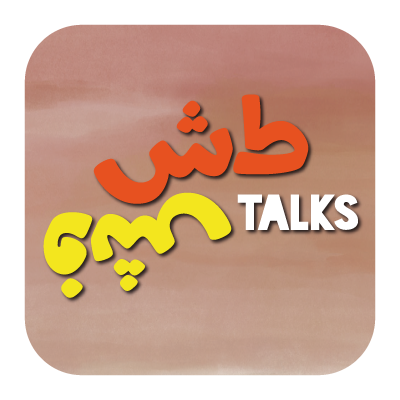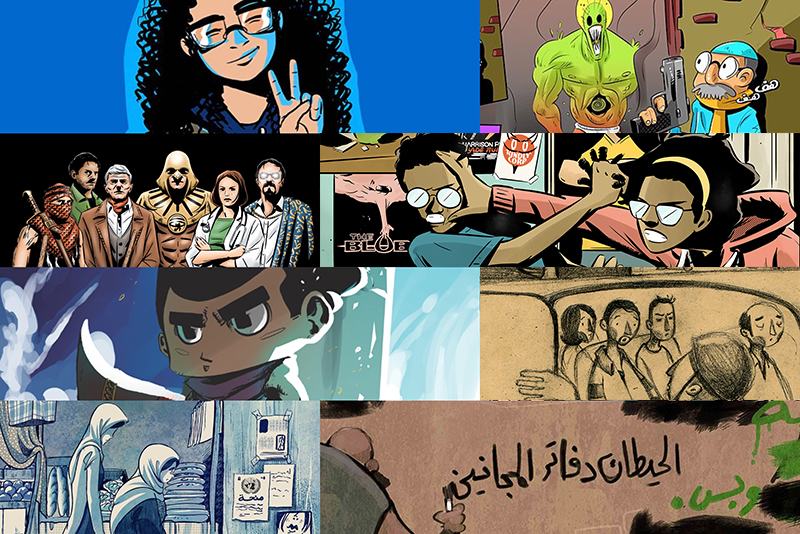Farcical Fables and Social Justice: 13 Arab Comic Book Artists to Follow
Arab comic book artists have sought to create original, unique, and captivating stories on the page.
By Gasser Ali
From the plucky, happy-go-lucky adventures in Samir, Sindbad, and the Arabic adaptations of Mickey Mouse, to the poignant political strips in newspapers, comic artists have been omnipresent in Arab culture as early as the 1920s. And while we can fall down a rabbit hole of ‘Um, actually’ trying to figure out the first and/or origin of Arabic comic books, instead we take a look at the contemporary artists that are subverting narratives, engaging with trauma, exploring personal woes, and creating the superheroes they’ll likely not find in Western comics. Here are 13 contemporary Arab comic book artists from across the region, in no particular order, perfecting the format, one speech bubble and brush stroke at a time.
1. Ahmed Raafat (Egypt)
The Egyptian comic book artist has made a name for himself with a variety of exciting projects, namely for co-creating the popular Egyptian superhero comic ‘El 3osba’, a ragtag group of superheroes, comparable to the Avengers, Justice League, and X-Men. In addition to the superhero series, Raafat’s also created several others, dabbling in noir comics, indie stories, and even posters for Netflix films.
2. Fouad Mezher (Lebanon)
Within the realm of Arab comic books, it’s hard not to have at least heard of the great works of this Lebanese artist. Mezher’s comics, graphic novels, and cartoons are brooding, gritty, and fascinating stories that you can just so easily lose yourself in a trance looking at. He’s most notable for horror and sci-fi stories, with his works featured in Lebanese anthology magazine Samandal, and exhibited at regional and international comic conventions such as Lucca Comics and Games festival (2010), CairoComix (2016), and the Angouleme Comics Festival (2017).
3. Asia Alfasi (Libya)
Even within the Arab world, it can be alienating and overwhelming to see the sheer amount of American comics that barely represent the Arab/Muslim experience, apart from rare exceptions. Scottish/Libyan comic book artist Asia Alfasi is a breath of fresh air, creating Manga-style comics influenced by her heritage. Alfasi’s work has taken her to festivals and conventions the world over, while also nabbing several coveted awards along the way.
4. Deena Mohamed (Egypt)
It’s very likely you’ve heard of this budding artist. Deena Mohamed rose to the comic scene with her debut comic ‘Al Qahera’ (Cairo, but also Arabic for ‘victorious’), that caught many a curious eye. The story followed a Muslim Egyptian superhero who battles the oxymorons and hypocrisies of patriarchal morals, sexual harassment, the agency of women, and so many more interesting themes explored through the adventures of the charming, bold, and valiant protagonist. Mohamed then followed the series with ‘Shubeik Lubeik’, a beautiful fictional story that explores wishful thinking and how it could be commodified.
5. Odai Karsou (Saudi Arabia)
Contemplative stories are always a fascinating read. To lose yourself into a character’s inner thoughts within their settings, and have a comic book writer and artist create an all-encompassing visual narrative is a singular brain-teasing experience. Karsou’s most notable series ‘Layal’ follows a woman with no brain, born into a world of senseless ignorance. The protagonist manoeuvres her way through society in the quest to find a brain, often stumbling and giving readers a first hand experience on how women can be gaslit in a society.
6. Sherif Adel (Egypt)
Tokyo-based Sherif Adel finds great levity in some of the darker side of life, with absurd twists and over-the-top character art. Adel’s most known series ‘Barbatoze’, launched in 2011, started out as a Tumblr blog of his alter ego going through a set of absurd parodies of current events, quickly becoming famed for his specific brand of satire.
7. Lena Merhej (Lebanon)
Artists that become their comic’s auteur are usually all the more special. Merhej has become an excellent craftswoman of storytelling. The Lebanese artist is also passing around the baton by founding the Story Center, an illustration, animation and comic books training programme for burgeoning artists. Her works have been recognised and awarded, both regionally and internationally.
8. Noha Habeib (Tunisia)
Telling the stories of Tunisia from a different light, Habeib’s works are always politically charged. The artist’s work ranges from vivid colours that really let the story come to life, to a noir that leaves one to ponder in its dichromatic world.
9. Diala Brisly (Kuwait)
From the palette, to the art, Brisli’s stories are just bait for the eyes. With incredibly soft textures, she explores the ravages of Syria’s refugee crisis. Her work earned her the opportunity to work on 12 animation movies, including both short and feature narrative films, and 6 TV programmes for BBC and Al Jazeera English.
10. Leila Abdelrazeq (Palestine)
The visual narrative format of comics allows for truly resonant stories and sophisticated entertainment. The Palestinian artist uses this fully formed narrative vehicle to explore diaspora, refugees, history, trauma, memory, and borders. Right out of the gate, Abdelrazeq’s debut graphic novel was shortlisted for the 2015 Palestine Book Awards, and was later translated to three languages.
11. Mohamed Al Mu’ti (Jordan)
Al Mu’ti creates truly bizarre characters and stories, all stemming from his deep-rooted passion for comics and character illustration. One of his earliest inspirations is SpongeBob’s Flying Dutchman, which is telling given most of his works are set in the open sea. His imagination whisks us away to adventures, with art that is both soothing and alarming to look at.
12. Salam Al Hassan (Syria)
The Dubai-based artist began his career in the late 90s as a cartoonist, and then after years of creating comic strips for publications, he directed two short animations, Damascus, One Hour and a Half and Short Dream. The films were screened at Tunisia’s Sousse International Film Festival and Lebanon’s Beirut Animated.
13. Abdullah Hadia (Libya)
Born in Ajdabiya, Libya, Hadia reimagined his homeland in fantastical settings and adventures that are both wholesome and engaging. He has worked with a variety of local and international platforms, including the BBC, and in 2015 he founded the Habka magazine, a platform focused on elevating and promoting Libyan artists.
Source



